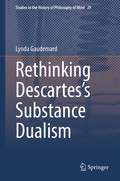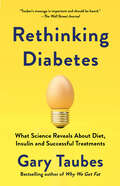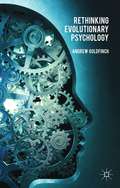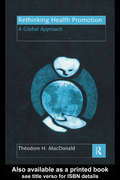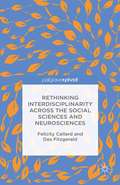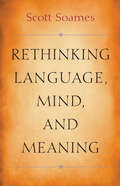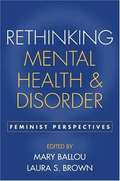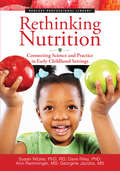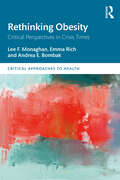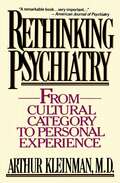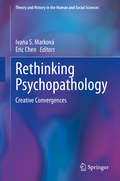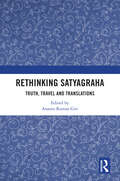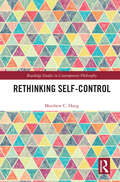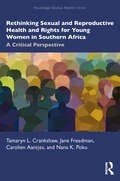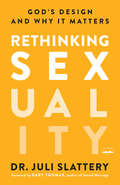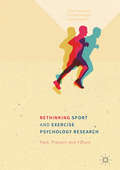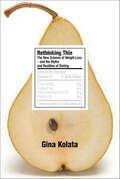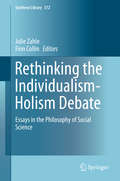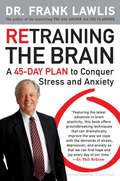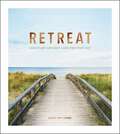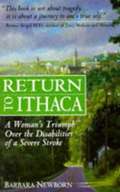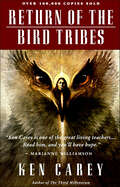- Table View
- List View
Rethinking Descartes’s Substance Dualism (Studies in the History of Philosophy of Mind #29)
by Lynda GaudemardThis monograph presents an interpretation of Descartes's dualism, which differs from the standard reading called 'classical separatist dualism' claiming that the mind can exist without the body. It argues that, contrary to what it is commonly claimed, Descartes’s texts suggest an emergent creationist substance dualism, according to which the mind is a nonphysical substance (created and maintained by God), which cannot begin to think without a well-disposed body. According to this interpretation, God’s laws of nature endow each human body with the power to be united to an immaterial soul. While the soul does not directly come from the body, the mind can be said to emerge from the body in the sense that it cannot be created by God independently from the body. The divine creation of a human mind requires a well-disposed body, a physical categorical basis. This kind of emergentism is consistent with creationism and does not necessarily entail that the mind cannot survive the body. This early modern view has some connections with Hasker’s substance emergent dualism (1999). Indeed, Hasker states that the mind is a substance emerging at one time from neurons and that consciousness has causal powers which effects cannot be explained by physical neurons. An emergent unified self-existing entity emerges from the brain on which it acts upon. For its proponents, Hasker’s view explains what Descartes’s dualism fails to explain, especially why the mind regularly interacts with one and only one body. After questioning the notion of emergence, the author argues that the theory of emergent creationist substance dualism that she attributes to Descartes is a more appropriate alternative because it faces fewer problems than its rivals. This monograph is valuable for anyone interested in the history of early modern philosophy and contemporary philosophy of mind.
Rethinking Diabetes: What Science Reveals About Diet, Insulin, and Successful Treatments
by Gary TaubesAn eye-opening investigation into the history of diabetes research and treatment by the award-winning journalist and best-selling author of Why We Get Fat • "[Gary] Taubes&’s meticulous, science-based work makes him the Bryan Stevenson of nutrition, an early voice in the wilderness for an unorthodox view that is increasingly becoming accepted."—Neil Barsky, The GuardianBefore the discovery of insulin, diabetes was treated almost exclusively through diet, from subsistence on meat, to reliance on fats, to repeated fasting and near-starvation regimens. After two centuries of conflicting medical advice, most authorities today believe that those with diabetes can have the same dietary freedom enjoyed by the rest of us, leaving the job of controlling their disease to insulin therapy and other blood-sugar-lowering medications. Rather than embark on &“futile&” efforts to restrict sugar or carbohydrate intake, people with diabetes can lead a normal life, complete with the occasional ice-cream cake, side of fries, or soda.These guiding principles, however, have been accompanied by an explosive rise in diabetes over the last fifty years, particularly among underserved populations. And the health of those with diabetes is expected to continue to deteriorate inexorably over time, with ever-increasing financial, physical, and psychological burdens. In Rethinking Diabetes, Gary Taubes explores the history underpinning the treatment of diabetes, types 1 and 2, elucidating how decades-old research that is rife with misconceptions has continued to influence the guidance physicians offer—at the expense of their patients&’ long-term well-being.The result of Taubes&’s work is a reimagining of diabetes care that argues for a recentering of diet—particularly, fewer carbohydrates and more fat—over a reliance on insulin. Taubes argues critically and passionately that doctors and medical researchers should question the established wisdom that may have enabled the current epidemic of diabetes and obesity, and renew their focus on clinical trials to resolve controversies that are now a century in the making.
Rethinking Evolutionary Psychology
by A. GoldfinchRethinking Evolutionary Psychology identifies, champions and vindicates a streamlined evolutionary psychology. It offers a new way of thinking that moves decisively away from theoretical and critical excess. Where standard accounts often obscure and distort, this book emphasizes and develops evolutionary psychology's heuristic credentials.
Rethinking Health Promotion: A Global Approach
by Theodore H. MacDonaldIn today's world 'health' means far more than merely the absence of illness. In Rethinking Health Promotion Theodore H. MacDonald sweeps away the confusion surrounding the function and position of health promotion. He argues that, far from being a modern innovation, health promotion has existed as a distinct and separate enterprise for as long as biomedicine and cautions against health promotion becoming organized merely an off-shoot of medical care. Drawing on the author's experience as a World Health Organisation consultant, the book also tackles the question of whether health promotion has relevance on an international scale or whether it is purely a eurocentric phenomenon. Against this background individual chapters explore universal factors such as sexual health, diet, unemployment, alcohol and tobacco use. With its critical and historical approach this book breaks new ground in assessing health promotion and will be stimulating reading for the wide variety of students and professionals studying health promotion.
Rethinking Informed Consent in Bioethics
by Neil C. Manson Onora O'NeillManson and O'Neill show why informed consent cannot be fully specific or fully explicit, and why more specific consent is not always ethically better.
Rethinking Interdisciplinarity across the Social Sciences and Neurosciences
by F. Callard D. FitzgeraldThis book offers a provocative account of interdisciplinary research across the neurosciences, social sciences and humanities. Rooting itself in the authors' own experiences, the book establishes a radical agenda for collaboration across these disciplines. This book is open access under a CC-BY license.
Rethinking Language, Mind, and Meaning
by Scott SoamesIn this book, Scott Soames argues that the revolution in the study of language and mind that has taken place since the late nineteenth century must be rethought. The central insight in the reigning tradition is that propositions are representational. To know the meaning of a sentence or the content of a belief requires knowing which things it represents as being which ways, and therefore knowing what the world must be like if it is to conform to how the sentence or belief represents it. These are truth conditions of the sentence or belief. But meanings and representational contents are not truth conditions, and there is more to propositions than representational content. In addition to imposing conditions the world must satisfy if it is to be true, a proposition may also impose conditions on minds that entertain it. The study of mind and language cannot advance further without a conception of propositions that allows them to have contents of both of these sorts. Soames provides it.He does so by arguing that propositions are repeatable, purely representational cognitive acts or operations that represent the world as being a certain way, while requiring minds that perform them to satisfy certain cognitive conditions. Because they have these two types of content--one facing the world and one facing the mind--pairs of propositions can be representationally identical but cognitively distinct. Using this breakthrough, Soames offers new solutions to several of the most perplexing problems in the philosophy of language and mind.
Rethinking Mental Health And Disorder: Feminist Perspectives
by Laura S. Brown Mary BallouThis volume presents cutting-edge work at the interface of feminist theory and mental health. Building on the success of their acclaimed Personality and Psychopathology, which called into question traditional models of health and disorder, Mary Ballou and Laura S. Brown have invited a stellar array of contributors to continue the vital process of feminist theory building and critique. The book outlines compelling theoretical approaches-including postmodern, constructivist, relational-cultural, and feminist ecological perspectives-that go beyond simply inserting analyses of gender, culture, and other contextual factors into existing paradigms. Also examined are specific areas of distress and disorder about which new feminist understandings have been developed in the past decade. Shedding new light on such conditions as depression, PTSD, psychosis, somatoform disorders, and premenstrual syndrome, chapters address critical questions about how disorders are diagnosed, who gets labeled as "sick," and how treatment is conceptualized and delivered.
Rethinking Nutrition
by Susan Nitzke Ann Ramminger Dave Riley Georgine JacobsWritten by a team of academic researchers and early childhood program practitioners, Rethinking Nutrition provides science- and practice-based information to meet young children's nutritional and developmental needs and establish healthy patterns with food. Each chapter includes a summary of key concepts and promising practices for early childhood settings.
Rethinking Obesity: Critical Perspectives in Crisis Times (Critical Approaches to Health)
by Emma Rich Lee F. Monaghan Andrea E. BombakTheoretically informed and empirically grounded, Rethinking Obesity invites readers to reconsider the medical and public health framing of population weight (gain) as a massive global problem, epidemic or crisis. Attentive to social values, scientific uncertainty and possible harms, the book furthers critique of the weight-centred health paradigm and world war on obesity. Building upon existing international literature from critical weight studies, fat studies and critical obesity research, the book advances scholarship with reference to body politics and health policy, epidemiology and obesity science, media reporting and weight-related stigma. The authors resist the common moralised narrative that ‘the overweight majority’ are lazy, gluttonous, and personally responsible for their actual or potential ills and the solution ultimately necessitates individual lifestyle change. Critique is also extended to seemingly compassionate public health interventions that putatively avoid victim-blaming through an appeal to ‘the obesogenic environment’, a consequence of modern living. Empirical case studies are grounded in women’s repeated and often frustrating experiences of dieting and schoolgirls’ encounters with fat pedagogy, which challenges dominant obesity discourse. Recognising that declared public health crises may become layered and cascade through society, this book also includes timely research on the COVID-19 pandemic response amidst concerns about lockdown weight-gain, heightened risk of infection and death among people deemed overweight and obese. Rethinking Obesity interrogates how social injustice is reproduced not only through cruelty but also through seemingly benevolent representations, pedagogies and policies. Alternative approaches and action, ranging from weight-inclusive health paradigms to broader social change, are also considered when seeking to foster collective hope in crisis times. This is valuable reading for students and researchers in medical sociology, social and population health sciences, physical education, critical weight and fat studies, and the social dimensions of the body.
Rethinking Psychiatry: From Cultural Category to Personal Experience
by Arthur KleinmanArthur Kleinman, a psychiatrist and medical anthropologist, approaches psychiatric diagnosis and the concepts of disease and illness from cross-cultural and anthropological perspectives.
Rethinking Psychopathology: Creative Convergences (Theory and History in the Human and Social Sciences)
by Ivana S. Marková Eric ChenThis book presents an original approach to the study of psychiatry that is based on a justified epistemological position, which demands that both the natural and the human/social sciences are necessary in developing our understanding. Psychiatry as a medical specialism was constructed in the nineteenth century through the interplay of both the natural sciences and the human/social sciences. This interplay has created a hybrid discipline that spans biological and socio-cultural-historical domains, which has raised challenges for its understanding and research. This book focuses on one of the principal challenges – how can we explore mental symptoms and mental disorders as complexes of neurobiology on the one hand and meaning on the other?The chapters in this book, dedicated to Germán E Berrios, founder of the Cambridge school of psychopathology, tackles distinctive aspects of psychopathology or related areas. By means of a combination of approaches, chapters seek to unfold another element in our understanding of this field as well as raise new directions for its further study. Rethinking Psychopathology is a valuable resource for clinical psychologists and psychotherapists, psychological researchers, historians of psychology, cultural psychologists, critical psychologists, social scientists, philosophers of psychology, and philosophers of science.
Rethinking Satyagraha: Truth, Travel and Translation
by Ananta Kumar GiriRethinking Satyagraha: Truth, Travel and Translations explores the multi-dimensional aspects of Satyagraha as a movement of being with and striving for and fighting for Truth and Truth realizations. The book goes beyond the conventional discourse of Satyagraha as a social and political action that Gandhi undertook, and links this to the wider moral, philosophical and spiritual quest that are implicated in Satyagraha with and beyond Gandhi. It links Satyagraha to our efforts to overcome the dualism between self and other in various ways. It also relates work and meditation with Truth in Satyagraha to translation and travel. It cultivates a new hermeneutics, politics and spirituality of Satyagraha which is simultaneously everyday and epochal. The book further invites us to rethink and transform the post-Truth discourse and live with Truth and truths—relative, relational and Absolute—with care, courage, creativity and transcendence.With contribution from leading scholars from across the world, Rethinking Satyagraha is a pioneering effort in reiterating the epochal significance of Satyagraha for the 21st century. It makes an important contribution to contemporary Gandhian scholarship and new horizons of social and political theory. It will be of interest to scholars and researchers of movement and resistance studies, Gandhi, Indian philosophy, cultural studies, literary studies, religious studies, development studies, sociology, anthropology, political science and future studies.
Rethinking Self-Control (Routledge Studies in Contemporary Philosophy)
by Matthew C. HaugResearch on self-control in both philosophy and psychology is thriving. Yet, despite a wealth of recent philosophical work on the exercise of self-control, there has been surprisingly little empirically informed work in philosophy on self-control as a psychological trait. This book aims to fill this gap.There is abundant evidence that self-control is beneficial both to those who have it and to the societies in which they live. This book shows that the neo-Aristotelian framework for understanding self-control-related traits, which has dominated both philosophy and the sciences, is psychologically unrealistic and should be replaced. The traditional conceptions of temperance and continence need to be revised so that they reflect actual human capacities. The author argues for an indirect harmony hypothesis, which claims that high trait self-control consists in having an excellent ability to use indirect strategies to achieve motivational harmony that would not otherwise be possible. He fruitfully combines work from ancient Greek philosophy, contemporary virtue ethics, philosophy of action, moral psychology, social psychology, and cognitive neuropsychology to develop a novel hypothesis about what constitutes human excellence with respect to self-control.Rethinking Self-Control is an essential resource for philosophers and psychologists interested in virtue ethics, moral psychology, philosophy of mind, philosophy of action, and ancient philosophy.
Rethinking Sexual and Reproductive Health and Rights for Young Women in Southern Africa: A Critical Perspective (Routledge Global Health Series)
by Jane Freedman Nana K. Poku Tamaryn Crankshaw Carolien AantjesThis important book provides a critical examination of the sexual and reproductive health and rights (SRHR) of young women and girls in Southern Africa, examining the ways in which current policies and programmes aimed at improving SRHR often fail to reach the most marginalised populations.Addressing key regional challenges such as high rates of HIV, unintended pregnancies, unsafe abortions, and sexual and gender-based violence, the book highlights how health inequalities in the region are in fact increasing, despite the 2030 Agenda for Sustainable Development of "leaving no one behind". The book draws on theoretical analysis and empirical data gathered from studies carried out in five Southern African countries (Madagascar, Mozambique, South Africa, Zambia, and Zimbabwe), arguing that a continued focus on HIV and interventions that target health in a narrow sense often fail to understand the wider socio-economic determinants of poor sexual and reproductive health and the ways in which girls and young women are made vulnerable. Written by leading scholars in the field, this will be essential reading for students and researchers in Global Health, International Development, Women’s Studies, and all related fields.
Rethinking Sexuality: God's Design and Why It Matters
by Gary Thomas Dr Juli SlatteryThis ground-breaking resource challenges and equips Christians to think and act biblically and compassionately in matters of sexuality.Sexual abuse, sex addiction, gender confusion, brokenness, and shame plague today's world, and people are seeking clarity and hope. By contesting long-held cultural paradigms, this book equips you to see how sexuality is rooted in the broader context of God's heart and His work for us on earth. It provides a framework from which to understand the big picture of sexual challenges and wholeness, and helps you recognize that every sexual question is ultimately a spiritual one. It shifts the paradigm from combating sexual problems to confidently proclaiming and modeling the road to sacred sexuality. Instead of arguing with the world about what's right and wrong about sexual choices, this practical resource equips you to share the love and grace of Jesus as you encounter the pain of sexual brokenness--your own or someone else's.
Rethinking Sport and Exercise Psychology Research
by Peter Hassmén Richard Keegan David PiggottThis book provides a comprehensive historical account of the evolution of Sport and Exercise Psychology research, charting the progression of the field from the early days when well-controlled experimental research was the standard, to the subsequent paradigm war between positivism, post-positivism and constructivism. The book challenges current thinking and makes a plea for a move towards a future in which the accumulation of knowledge is at the core of Sport and Exercise research, rather than simply methods and measurements. The result is a critique not only of exercise and sport psychology, but of psychological research methods more broadly. It will be of great interest to researchers and students working in Sport Science, Research Methods, and Psychology.
Rethinking Thin: The New Science of Weight Loss—and the Myths and Realities of Dieting
by Gina KolataIn this eye-opening book, New York Times science writer Gina Kolata shows that our society's obsession with dieting and weight loss is less about keeping trim and staying healthy than about money, power, trends, and impossible ideals.Rethinking Thin is at once an account of the place of diets in American society and a provocative critique of the weight-loss industry. Kolata's account of four determined dieters' progress through a study comparing the Atkins diet to a conventional low-calorie one becomes a broad tale of science and society, of social mores and social sanctions, and of politics and power.Rethinking Thin asks whether words like willpower are really applicable when it comes to eating and body weight. It dramatizes what it feels like to spend a lifetime struggling with one's weight and fantasizing about finally, at long last, getting thin. It tells the little-known story of the science of obesity and the history of diets and dieting—scientific and social phenomena that made some people rich and thin and left others fat and miserable. And it offers commonsense answers to questions about weight, eating habits, and obesity—giving us a better understanding of the weight that is right for our bodies.
Rethinking the Buddha
by Eviatar ShulmanA cornerstone of Buddhist philosophy, the doctrine of the four noble truths maintains that life is replete with suffering, desire is the cause of suffering, nirvana is the end of suffering, and the way to nirvana is the eightfold noble path. Although the attribution of this seminal doctrine to the historical Buddha is ubiquitous, Rethinking the Buddha demonstrates through a careful examination of early Buddhist texts that he did not envision them in this way. Shulman traces the development of what we now call the four noble truths, which in fact originated as observations to be cultivated during deep meditation. The early texts reveal that other central Buddhist doctrines, such as dependent-origination and selflessness, similarly derived from meditative observations. This book challenges the conventional view that the Buddha's teachings represent universal themes of human existence, allowing for a fresh, compelling explanation of the Buddhist theory of liberation.
Rethinking the Individualism-Holism Debate
by Finn Collin Julie ZahleThis collection of papers investigates the most recent debates about individualism and holism in the philosophy of social science. The debates revolve mainly around two issues: firstly, whether social phenomena exist sui generis and how they relate to individuals. This is the focus of discussions between ontological individualists and ontological holists. Secondly, to what extent social scientific explanations may and should, focus on individuals and social phenomena respectively. This issue is debated amongst methodological holists and methodological individualists. In social science and philosophy, both issues have been intensively discussed and new versions of the dispute have appeared just as new arguments have been advanced. At present, the individualism/holism debate is extremely lively and this book reflects the major positions and perspectives within the debate. This volume is also relevant to debates about two closely related issues in social science: the micro-macro debate and the agency-structure debate. This book presents contributions from key figures in both social science and philosophy, in the first such collection on this topic to be published since the 1970s.
Retraining the Brain: A 45-Day Plan to Conquer Stress and Anxiety
by Frank LawlisFrom the "New York Times"-bestselling author of "The ADD Answer" comes this work that explains the neurological factors that make stress so traumatizing and lays out a powerful plan for changing the brain to improve coping skills.
Retreat: Sanctuary and Self-Care for Every Day
by Sally BrockwayRelax. Refresh. Restart.Amid the commotion of everyday life, finding a few precious moments of “me time” can be challenging. With so many demands on our attention, knowing how to get the most out of our limited downtime is more important than ever.Discover new ways to take some time out with this invaluable guide to finding and creating sanctuary. Whether you’re searching for serenity at home or seeking solace in the great outdoors, this book is packed with self-care tips, calming crafts and delicious recipes to help you relax, recharge and rejuvenate.
Retrolental Fibroplasia and Autistic Symptomatology: An Investigation into Some Relationships Among Neonatal, Environmental, Developmental and Affective Variables in Blind Prematures
by Joan B. ChaseIn this monograph, based on a study of 263 subjects with RLF (Retrolental Fibroplasia-- an eye condition caused by excessive incubator oxygen), the author examines selected variables which may significantly affect subsequent development.
Return To Ithaca: A Woman's Triumph Over The Disabilities Of A Severe Stroke
by Barbara NewbornWhen she was 21 years old Barbara Newborn's dreams of teaching English and getting married were cruelly shattered when she suffered a severe stroke. Her world changed overnight. One day she was an independent, happy and carefree young woman, the next she was paralyzed, had lost the ability to think or communicate, and was a stranger even to herself.
Return of the Bird Tribes
by Ken Carey“The priceless wisdom of Native America . . . If we are to survive, we must adopt it . . . Return of the Bird Tribes illuminates the path.” —Whitley Strieber, #1 New York Times–bestselling authorExploring the transformative impact of Native American spirituality on contemporary events, this is the third book in Ken Carey’s bestselling Starseed series, which concluded with The Third Millennium, the book Marianne Williamson calls “a kind of millennial Bible.”“A profound and thought-provoking account of many enlightened connections . . . Let’s hope that it will enlighten many and help thousands to plant a tree of love, peace, and understanding.” —Dr. Elisabeth Kübler-Ross, author of On Death and Dying“The poetic, spiritual wisdom of Return of the Bird Tribes resonates deeply in my heart.” —Ram Dass, author of Grist for the Mill“A timely and thoughtful rendering of Native American spiritual teachings whose universal and prophetic input encompass an understanding of our current global crisis and the promise of earth reawakened.” —José Argüelles, author of The Mayan Factor“A book that captures the spirit of my ancestors and makes the reader know that each of us is the marriage of the Sky Nation and the Earth Mother.” —Jamie Sams, author of Sacred Path Cards
